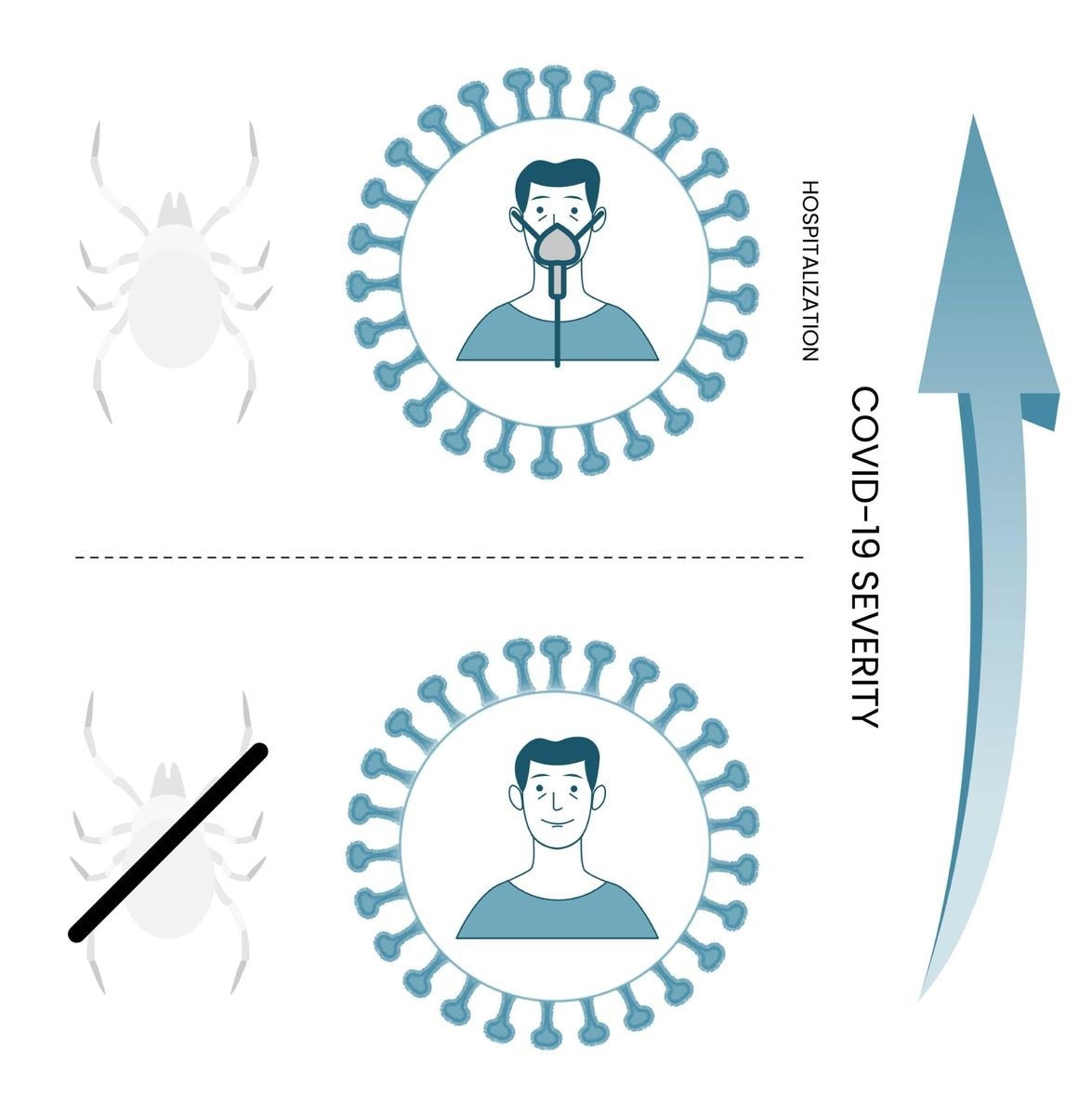Due to the similarity between its symptoms and those of other infections, Lyme disease often remains undiagnosed and untreated. This increases the risk that the infection will spread to other parts of the body, including the joints, heart, and nervous system.
Serological detection of antibodies developed against multiple Borrelia antigens is the primary diagnostic method for Lyme disease. However, since these antibodies can persist in the blood, even after successful antibiotic treatment, serological testing is not sufficient to differentiate between recent and past infections.
Lyme disease and COVID-19 share similar flu-like symptoms.
During the COVID-19 pandemic, a reduction in the number of Lyme disease cases has been observed in Poland. This could be due to a reduction in outdoor activities as a result of pandemic-related movement restrictions. However, there is one case report describing that the administration of anti-COVID medications in a patient with both Borrelia infection and COVID-19 led to suppression of Lyme disease.
Given these observations, the current study investigated whether Borrelia infection can influence the clinical course of COVID-19.
Study design
The study population included both severely ill and mild or asymptomatic COVID-19 patients.
A total of 31 severely ill and hospitalized patients were included in the study. These patients required either non-invasive or invasive ventilation during their hospital stay.
In the mild/asymptomatic cohort, a total of 28 seropositive patients were included. These patients were either treated at home or previously unaware of their COVID-19 diagnosis. In addition, 28 seronegative individuals were included as controls.
Serum samples were collected from the patients for serological identification of severe acute respiratory syndrome coronavirus 2 (SARS-CoV-2) and Borrelia infections.
 Risks in COVID-19 are linked to a history of tick bites and related infections.
Risks in COVID-19 are linked to a history of tick bites and related infections.
Prevalence of Lyme disease in COVID-19 patients
The multi-antigen microblot-array used to diagnose Borrelia infection revealed the presence of Lyme disease in all hospitalized COVID-19 patients. Of the 28 mild or asymptomatic patients, 19 were identified to have Lyme disease. In contrast, only eight of the 28 seronegative control individuals were diagnosed with Lyme disease.
The immunoglobulin G (IgG) antibodies developed against all tested anti-Borrelia antigens showed significantly higher titers in severely ill COVID-19 patients as compared to those observed in SARS-CoV-2 seronegative individuals.
Notably, severe COVID-19 patients exhibited significantly higher levels of antibodies targeting anti-Anaplasma antigens. Anaplasma phagocytophilum is another bacterium that co-transmits with Borrelia through tick bites.
Regarding anti-Borrelia IgM antibodies, 24 of the 31 hospitalized patients, 13 of the 28 mild/asymptomatic patients, and 15 of the 28 control individuals exhibited seropositivity.
The statistical analysis considering all Borrelia-specific antigens revealed that the risk of COVID-19-related hospitalization increased with each IgG seropositive test against a specific antigen. However, no such correlation was observed for IgM antibodies.
Thus, patients with higher levels of anti-Borrelia IgG antibodies are at a greater risk of severe COVID-19 and related hospitalization.
Conclusions
The current study revealed that previous exposure to the Borrelia bacterium can increase the risk of severe COVID-19. Other types of infections caused by tick bites, such as Anaplasma infection, may also serve as a potential risk factor for severe COVID-19.
Considering the three most immunogenic Borrelia-specific antigens, including OspC, OspA, and p41, increased levels of anti-Osp IgG antibodies were found to strongly predict the risk of COVID-19-related hospitalization.
Taken together, screening of anti-Borrelia antibodies in COVID-19 patients could be an effective strategy to identify high-risk patients and ultimately improve the management of COVID-19 patients.

 *Important notice: Research Square publishes preliminary scientific reports that are not peer-reviewed and, therefore, should not be regarded as conclusive, guide clinical practice/health-related behavior, or treated as established information.
*Important notice: Research Square publishes preliminary scientific reports that are not peer-reviewed and, therefore, should not be regarded as conclusive, guide clinical practice/health-related behavior, or treated as established information.
Journal reference:
- Preliminary scientific report.
Szewczyk-Dabrowska, A., Budziar, W., Harhala, M., et al. (2022). Correlation between COVID-19 severity and previous exposure of patients to Borrelia spp. Research Square. doi:10.21203/rs.3.rs-1799732/v1.